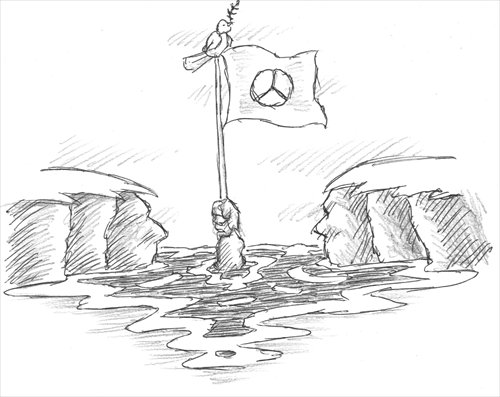HOME >> BUSINESS
Cooperation with ASEAN a balm to sea dispute
By Wang Dehua Source:Global Times Published: 2016/7/12 0:43:01

Illustration: Peter C. Espina/GT
The South China Sea issue has heated up since Philippine authorities, with the connivance of the US, misused international law to force through an arbitration award on the South China Sea. The competition and confrontation between China and the US seems to have become evident through disputes in the South China Sea, and both sides are starting to judge each other's intentions from a strategic point of view. Given this fact, I couldn't help pondering the possibility of military conflict between China and the US if the latter truly "takes further action." And my argument is that we need to raise the flag of "shelving differences, seeking joint development and engaging in independent development," while girding our loins to safeguard national sovereignty and territorial integrity, as the rivalry in the South China Sea is not inevitable.
The principle of "shelving differences and seeking joint development," brought forth by late Chinese leader Deng Xiaoping, was characteristic of the times. It created a new mindset for territorial disputes to be resolved in a peaceful fashion and was considered the best choice for unraveling maritime disputes. Deng made reasonable claims about handling disputes over the Nansha Islands in the 1970s and 1980s when he met with leaders from Southeast Asian countries that entered into diplomatic relations with China.
In June 1986, Deng told visiting Filipino Vice President Salvador Laurel that, "The issue of the Nansha Islands can be left aside for a while. We shouldn't let this problem stand in the way of China's friendship with the Philippines and other countries." Deng reiterated his stance when he met with visiting Philippine president Corazon C. Aquino in April 1988. Deng's initiative received a positive response from both Aquino and Laurel. On top of that, Deng expounded the country's stance that the sovereignty over the Nansha Islands belongs to China.
For more than 30 years, China has been adamantly pursuing the principle of claiming sovereignty over the South China Sea, setting aside disputes and seeking joint development, as a consequence of which the issue of the South China Sea has long continued to be controllable. The relationship between China and ASEAN countries can serve as a good example of economic ties growing closer over the years. China and Southeast Asian countries have had a golden 20-year period since the 1990s, with economic and trade relations between the two sides having grown dramatically.
But China's long-held principle has now been severely challenged, though the country still remains unfazed. For example, China has kept pace with the times by seeking independent development while relevant claimant countries have refused to comply with the principle of joint exploration. Additionally, China is moving to reclaim land on some reefs and deploy China National Offshore Oil Corporation's Haiyang Shiyou 981 drilling platform in the South China Sea. This has kept the US and Japan on tenterhooks. They smear China with claims that China is militarizing the South China Sea, but they nonetheless turned a blind eye many years ago to other countries' construction of missile positions and radar stations, as well as their deployment of numerous tanks and artilleries, on the islands and reefs they had illegally occupied. Furthermore, as a country outside of the region, the US is ramping up its actions to actually "militarize" the South China Sea. For instance, in an attempt to provoke China and carry out point-blank surveillance activities, the US sent a military fleet and airplanes to trespass on islands and reefs garrisoned by China and in waters and airspace in the vicinity of the islands and reefs. The US has also made efforts to pressure its allies and partners to conduct joint military exercises and join joint cruises in the South China Sea. Closing its eyes to such militarized activities, the US has long engaged in groundless fault-finding with China's reasonable and legitimate activities to build its defensive powers.
We must avoid an acceleration of the disputes, considering that some irrelevant countries - out of undesirable motives - have deliberately exaggerated the volume of oil reserves and other mineral resources in addition to the number of fish and shrimp in the disputed areas, hyping up the value of economic development in them. Despite being battered by storms, China will remain sober-minded. It is believed that China's refusal and non-recognition of the forthcoming award by a UN arbitration court that applies rules with no legal effect will be well received by a growing number of countries and insightful people. And if we can step up economic cooperation with ASEAN countries, advancing negotiations on the Regional Comprehensive Economic Partnership and other regional ties, the tension over the South China Sea is expected to ease.
That being the case, regardless of the loud cries and great havoc that a certain country has raised, we should keep our composure and respond in a reasonable and restrained manner. We also never plan to use military force to settle disputes over the islands and reefs in the South China Sea. Meanwhile, we need to make the public aware of the evil intentions harbored by hegemonic powers. China is by its very nature a peace-loving country, but it also won't behave in a cowardly way if it gets involved in disputes. Under no circumstances will China allow its sovereignty and security interests to be harmed, and in no instance will China sit silently by and watch a few countries make a mess of the South China Sea.
The author is a researcher at the Shanghai Institutes for International Studies. bizopinion@globaltimes.com.cn
Posted in: Expert assessment